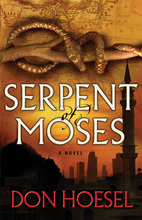 In the book of Numbers, as the Israelites were wandering in wilderness after rejecting the promised land, they became discouraged and spoke against God, who had freed them from slavery in Egypt and performed many miracles to keep them safe and whole. In response to their hardheartedness, God plagued them with fiery serpents, which were killing them left and right. When the people recognized their sin, and asked Moses to pray for them, God responded with a cure: Moses was to commission a fiery serpent, made of bronze, and lift it high on a pole--then any who looked to the serpent would be cured. Later, in the time of the kings, people worshiped the bronze serpent, called Nehushtan, and King Hezekiah ordered its destruction.
In the book of Numbers, as the Israelites were wandering in wilderness after rejecting the promised land, they became discouraged and spoke against God, who had freed them from slavery in Egypt and performed many miracles to keep them safe and whole. In response to their hardheartedness, God plagued them with fiery serpents, which were killing them left and right. When the people recognized their sin, and asked Moses to pray for them, God responded with a cure: Moses was to commission a fiery serpent, made of bronze, and lift it high on a pole--then any who looked to the serpent would be cured. Later, in the time of the kings, people worshiped the bronze serpent, called Nehushtan, and King Hezekiah ordered its destruction. However, according to Don Hoesel, it may not have been as thoroughly "broken into pieces" as the bible implies.
Don Hoesel's timing in his novel, Serpent of Moses, is superb, reading like an adventure movie. The reader is instantly dropped into the action - almost like a prologue, the Libyans first encounter mysterious Israelis and an archaeologist in the initial, unsuccessful attempt to recover the bronze serpent, but the suspicious foreigners are killed before the Libyans can interrogate them and discover their interest in the area. [Were it a film, insert credits here]. The next scene, occurring two weeks later, introduces our hero, archaeologist Jack Hawthorne, dodging bullets in a narrow tunnel, running for his life.
He and Indiana Jones could really swap some stories.
Interspersed between Jack's close calls, captures, and escapes while trying to hang on to the archaeological artifact are the journeys of his friends who are trying to locate him and extract him from whatever trouble into which he has dropped himself. As they solve the clues that brought him to where he is, the reader learns how Jack found the serpent in the first place, while providing his friends with the clues to the other missing piece of the serpent--something Jack is desperately going to need, if he and his friends are to have any hope of surviving this adventure.
Hoesel's novel is well-written and fast-paced, much like an adventure film. It even has little bits of humor that often make adventures so appealing--our hero, though typically able to hold his own or outsmart the antagonists, ends up with a vision of Imolene's massive fist as the last thing he sees on several occasions.
Hoesel's story clearly follows a previous novel, Elijah's Bones, and I believe it would be better to read them in order, but Serpent of Moses still makes sense without the first. It just leaves one hungering to find out what precisely did happen in Australia that changed their lives so thoroughly . . . My understanding is that Jack's spiritual state undergoes a major transformation in the first book, but Hoesel does not delve too deeply in this novel. It is clear that Jack is still working out the details of his spiritual life--and maybe he doesn't have a personal relationship with Jesus yet--but he clearly recognizes the bible as truth. I hope that subsequent novels will further his spiritual journey, as I at least am not completely satisfied with where he seems to be right now.
Overall I very much enjoyed the book, but I would have liked to see more conclusion to the novel; it ended rather quickly. **SPOILERS** Were the Libyans all killed in the final skirmish? Were the good guys really the only ones left standing after the Israelis departed? It was a little unclear, but I have difficulty in believing that were any Libyans still alive, they'd have let them go so easily. This is where a movie could clearly show the decimation in a 2-3 second shot!
I received a free copy of this novel from Bethany House Publishers as part of their book review program, and I am under no obligation to write a positive review.